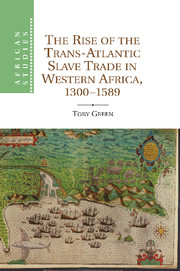Crossref Citations
This Book has been
cited by the following publications. This list is generated based on data provided by Crossref.
Zeuske, Michael
2012.
Historiography and Research Problems of Slavery and the Slave Trade in a Global-Historical Perspective.
International Review of Social History,
Vol. 57,
Issue. 1,
p.
87.
Julie Hardwick
Sarah M. S. Pearsall
and
Karin Wulf
2013.
Introduction: Centering Families in Atlantic Histories.
The William and Mary Quarterly,
Vol. 70,
Issue. 2,
p.
205.
Belich, James
2014.
Pacific Histories.
p.
263.
2014.
Slavery and Slaving in African History.
p.
29.
Havik, Philip J.
2015.
Female Entrepreneurship in West Africa: Trends and Trajectories.
Early Modern Women: An Interdisciplinary Journal,
Vol. 10,
Issue. 1,
p.
164.
Rijkelijkhuizen, M. J.
Kootker, L. M.
and
Davies, G. R.
2015.
Multi-isotope analysis of elephant ivory artefacts from Amsterdam: a preliminary provenance study.
World Archaeology,
Vol. 47,
Issue. 3,
p.
504.
Petrocelli, Rachel M.
2016.
Painting between the lines: the Cape Verdean community of Colonial Dakar, 1920–1945.
Canadian Journal of African Studies / Revue canadienne des études africaines,
Vol. 50,
Issue. 2,
p.
149.
Lang, Jürgen
2017.
Tangomão – À propos de l’origine et de l’histoire du terme.
Études créoles,
Cagle, Hugh
2018.
Assembling the Tropics.
Pardue, Derek
2018.
Creole chronotopes: the convergences of time and place in becoming black.
Identities,
Vol. 25,
Issue. 4,
p.
417.
Bah, Essa
Jackson, Karen
and
Potts, David
2018.
Regional trade institutions in West Africa: Historical reflections.
Journal of International Development,
Vol. 30,
Issue. 8,
p.
1255.
Chouin, Gérard
2018.
Reflections on plague in African history (14th–19th c.).
Afriques,
Vol. 09,
Issue. ,
Mota, Thiago H.
2019.
The Ivory Saltcellars: A contribution to the history of Islamic expansion in Greater Senegambia during the 16th and 17th centuries.
Afriques,
Vol. 10,
Issue. ,
Katz, Steven T.
2019.
The Holocaust and New World Slavery.
Østebø, Terje
2020.
Islam, Ethnicity, and Conflict in Ethiopia.
Ujuaje, Mama D.
and
Chang, Marina
2020.
Systems of Food and Systems of Violence: An Intervention for the Special Issue on “Community Self Organisation, Sustainability and Resilience in Food Systems”.
Sustainability,
Vol. 12,
Issue. 17,
p.
7092.
2021.
Race and Diplomacy in Zimbabwe.
p.
346.
Galli, Stefania
and
Rönnbäck, Klas
2021.
Land distribution and inequality in a black settler colony: the case of Sierra Leone, 1792–1831†.
The Economic History Review,
Vol. 74,
Issue. 1,
p.
115.
Pailey, Robtel Neajai
2021.
Development, (Dual) Citizenship and Its Discontents in Africa.
2021.
Le monde atlantique.
p.
349.



